JERUSALEM — On the doorstep of the Alexander Nevsky Church, the smell of burning incense mingles with the scents of the spice vendors in the heart of the Old City.
This church, which stands among some of Christianity’s most holy sites, at first appears far removed from the Ukraine-Russia war. But upon a closer look, the effects of the war can be found everywhere.
“We don’t want these discussions that Ukrainians have occupied a Russian church,” says Sister Elizabeth, one of six nuns from Ukraine living here, standing amid 19th-century relics from the Russian Empire.
“But we understand that as soon as Russia takes over the property, we, Ukrainians, will most likely be kicked out of here.”
Positioned just a few dozen meters away from Calvary — where Jesus was believed to have been crucified — and directly behind the Church of the Holy Sepulchre, the Alexander Nevsky Church was built by adherents of the Russian Orthodox Church in the late 1800s.
The Kremlin said last year that gaining custody of the church, named after a revered medieval Russian leader, was at the top of its agenda with Israel.
An Israeli court in January halted an effort to transfer the church’s ownership to the Russian government.
While the court’s move has left President Vladimir Putin’s wish hanging in the air, it has also meant that the Ukrainian nuns can continue to pray here without expulsion — for now.
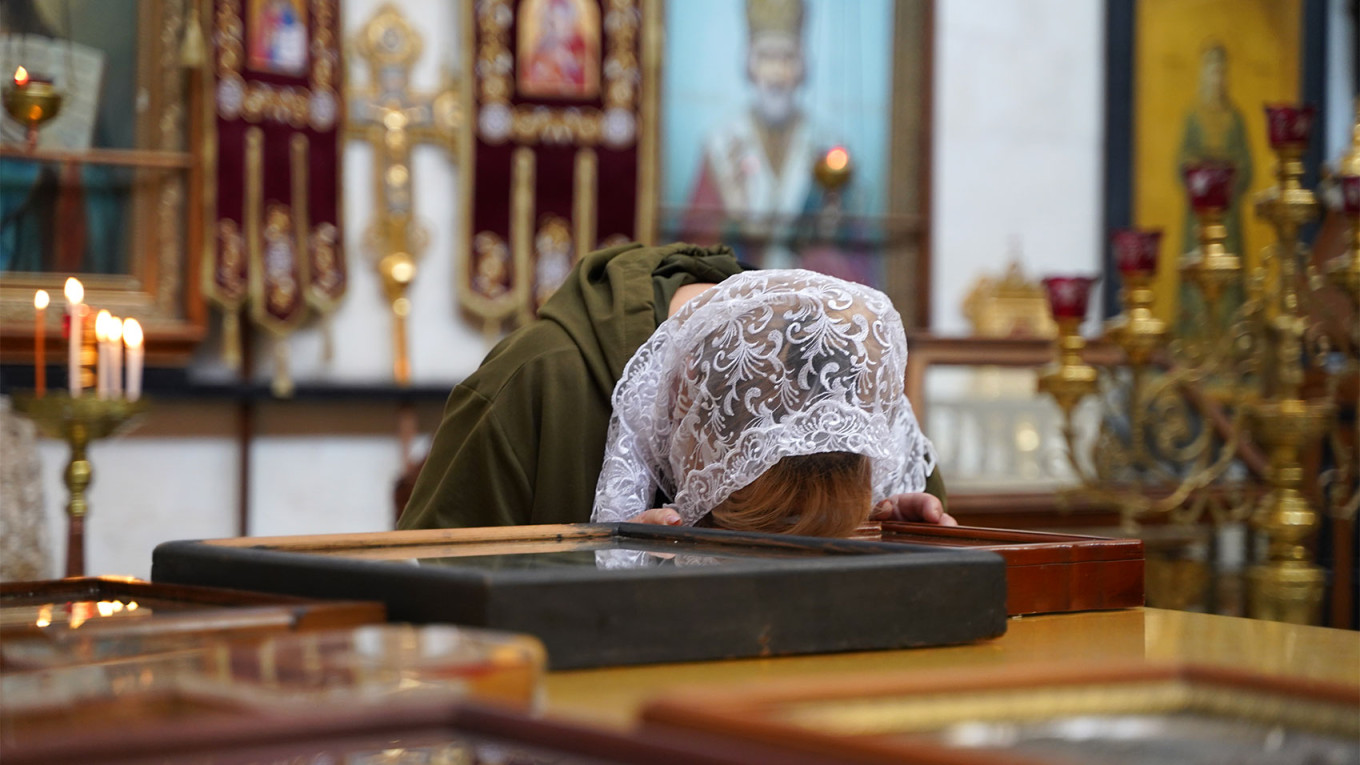
Downstairs, at the level of ancient Jerusalem, stone walls and icons seem to guard the silence around the sanctuary. Sister Ioanna stands in front of a crucifix towering above the presumed place where Jesus heard his sentence before being taken to his crucifixion.
A woman in her 50s with a sober demeanor, Sister Ioanna arrived in Jerusalem two weeks after Russia invaded in February 2022. Her face framed by a white veil, she is cautious when it comes to discussing anything related to politics, except for war.
As Russian troops were trying to encircle Kyiv, she was unable to return to her monastery in the Zhytomyr region of Ukraine.
“The roads were already destroyed, there was no communication, and they started bombing,” Sister Ioanna recalls.
Her spiritual father decided to send her and a few other nuns to the Alexander Nevsky Church, to which the Orthodox Sisters of Mercy has been historically connected.
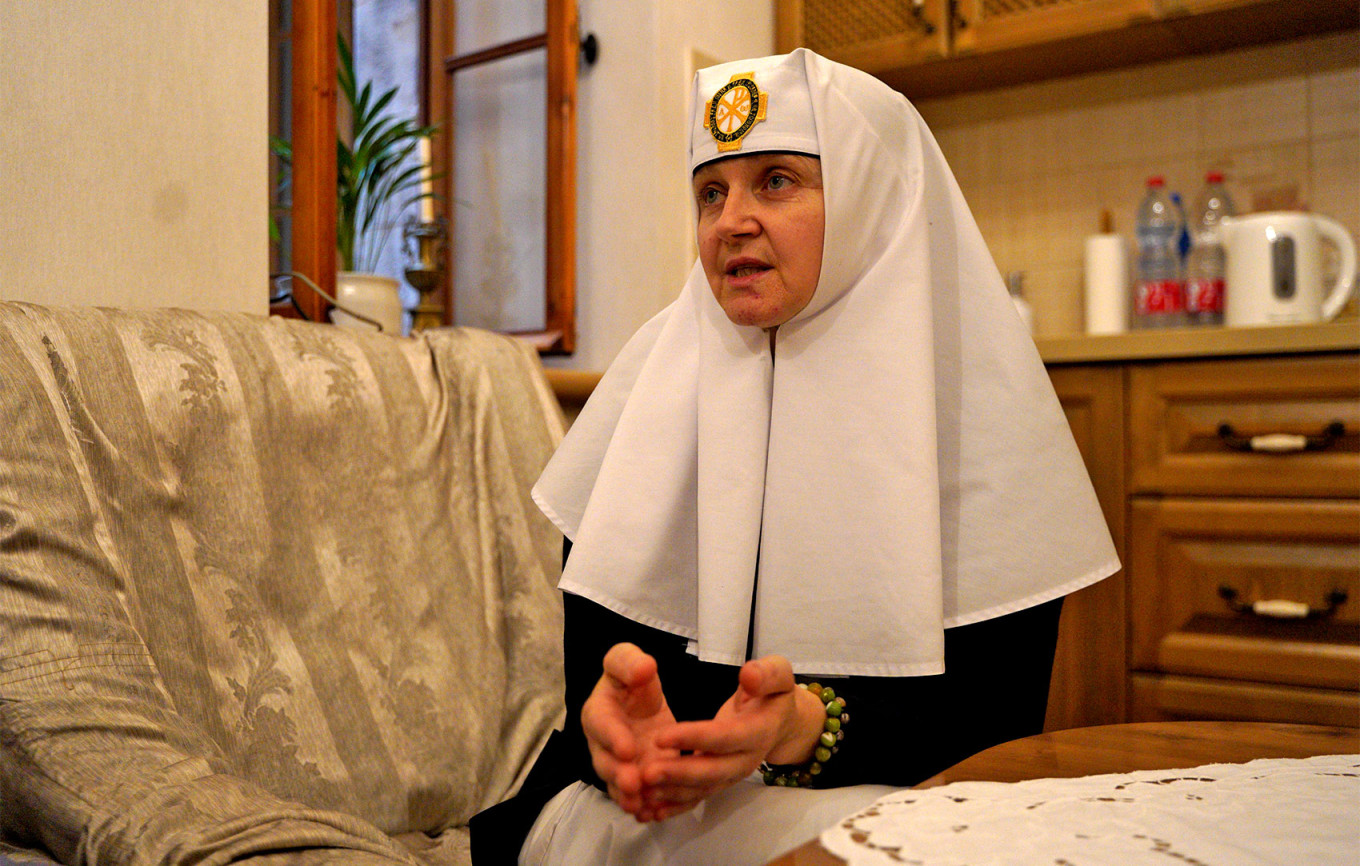
But the Ukrainian nuns could not fully escape war. Apart from the Israeli-Hamas war raging to the south, Russia’s efforts to seize ownership of the church and the land it sits on are a constant reminder of the country that invaded theirs.
Their prayers hold symbolic resonance and an implied defiance amid the serene spirituality. They pray not only for peace but for Ukraine’s defenders.
In local media, the Alexander Nevsky Church is often referred to as Putin’s favorite Jerusalem church. When told this, Sister Elizabeth, 30, from the Zhytomyr region, can’t help but grin.
“This place is supposed to be an international place, for everyone, and it should keep its historical mission,” she says.
Before the full-scale invasion, nuns and secular visitors from Georgia, Belarus, and Russia could visit. Now, nuns from Moscow’s state-affiliated Orthodox Church do not come here due to the ongoing dispute over the property’s ownership, and only ordinary Russian citizens can be found on the premises.
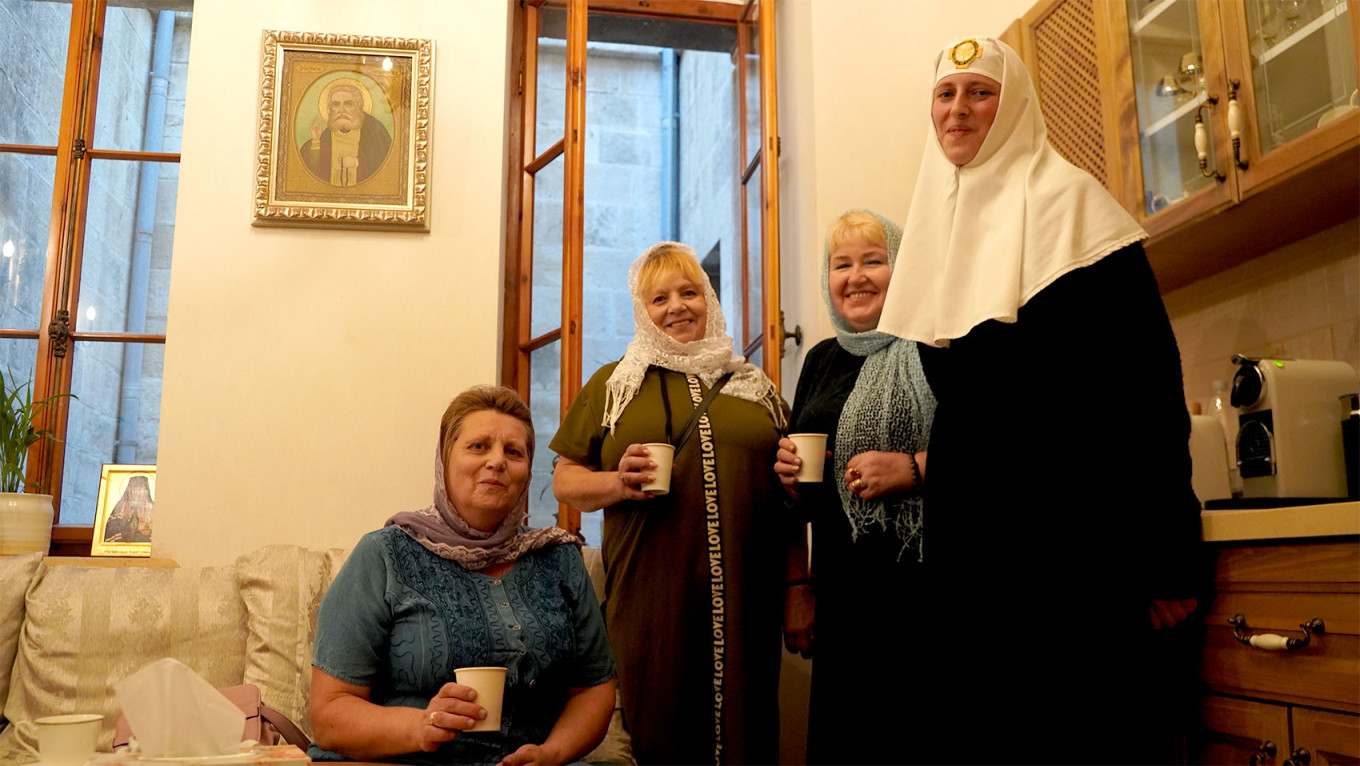
Ukrainian nuns prefer not to speak about politics, as they renounce their desires and thoughts before God. For them, the historical and spiritual meaning of the site is above Russia’s interests.
But Russia’s war in Ukraine is something they cannot get off their hearts and minds. All of them have relatives there, and some lived through some of the worst days of the invasion.
Sister Elizabeth was in Jerusalem when her loved ones had to take refuge in a monastery, endangered by the Russian advance toward the Zhytomyr region.
“Rockets were flying, falling near the monastery and shattering window panes. There was no electricity. Some houses in front were hit, and nearby villages were destroyed. Well, the Lord protected the sanctuary,” she says.
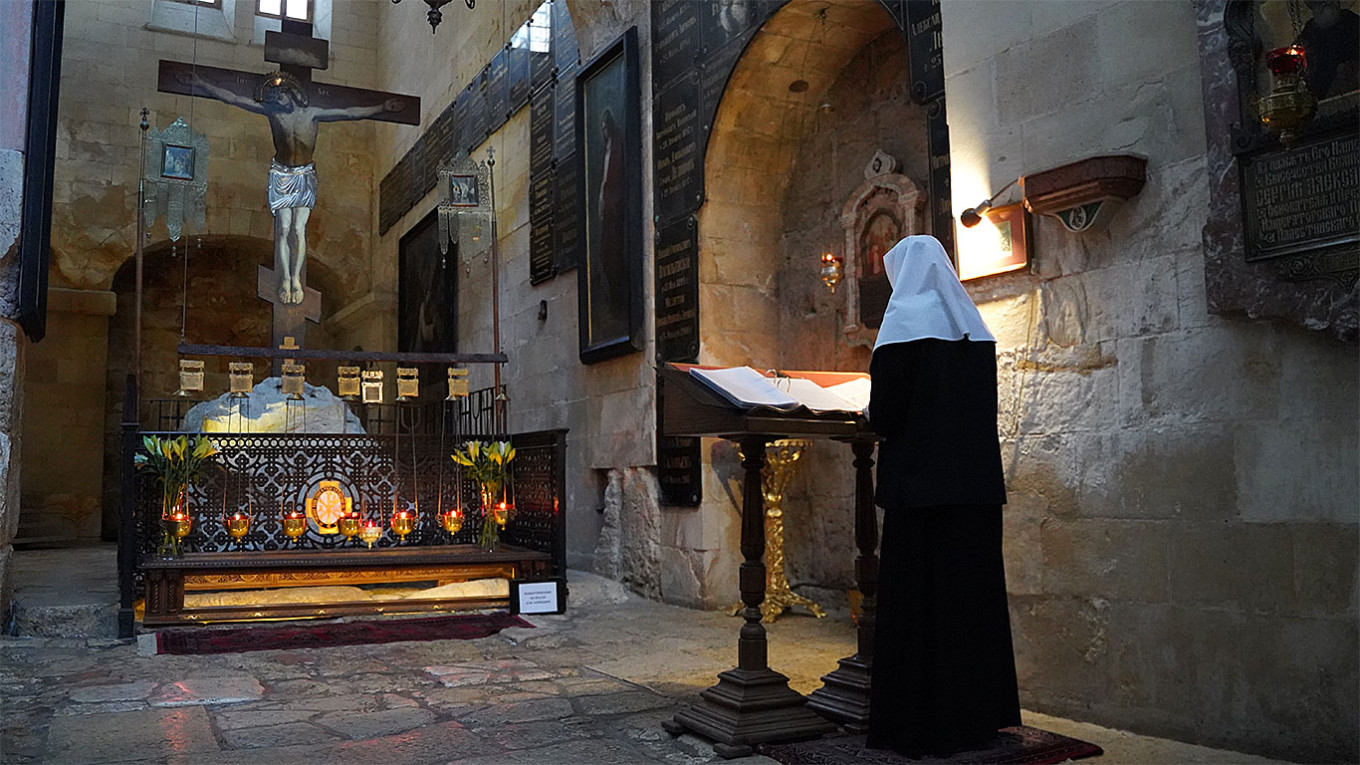
When the full-scale Russian invasion began last year, many Ukrainian women began coming to the Alexander Nevsky Church to pray and seek intercessions. Many of these women who emigrated to Israel for work 10-20 years ago now have sons, husbands, or other relatives defending their country on the frontline. Sister Elizabeth has become friends with most of them.
“Every woman comes here with her own grief,” nun Elizabeth says.
Ukrainian soldiers often call them to ask for prayers when heading into battle or when it’s tough at the frontline, the sisters say. Yet while there is a special prayer for Ukrainians, prayer requests are open to anyone, including Russians.
“We don’t divide people by nationality, and we don’t separate notes. Sometimes a mother comes and submits two names — one son in Ukraine, another in Russia. One is fighting here, the other there. There are people whose part of the family is in Ukraine, and part is in Russia,” Sister Ioanna says. “We write the name and pray.”
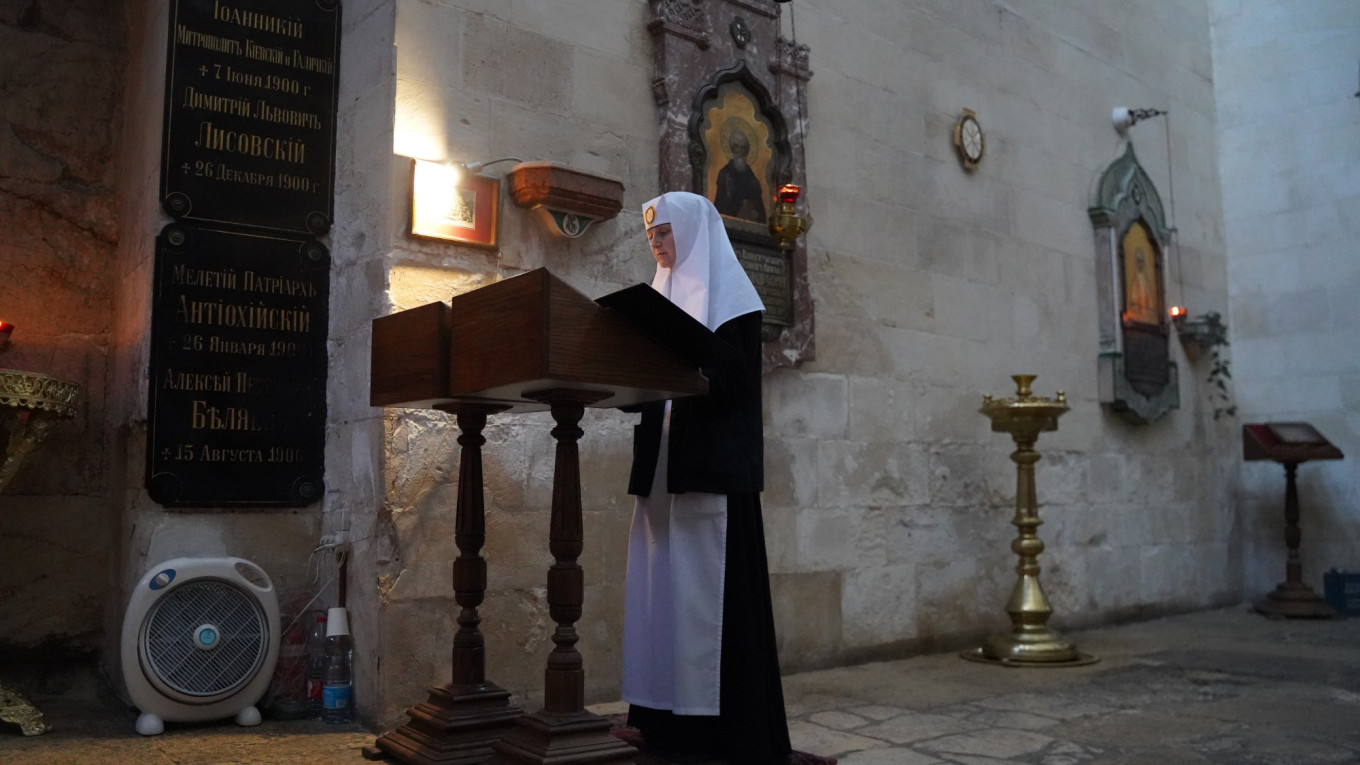
Renouncing personal wishes and thoughts, nuns articulate themselves with restraint. But after a while, Sister Elizabeth admits that, as a Ukrainian, she’s praying for her country’s victory and an end to people’s suffering.
“You know what is funny? [Many Russians] think this place is theirs. The propaganda works so much there that they do not even think it does not belong to them. They come here as if it were their home,” she adds.
With her background in diplomacy, Sister Elizabeth is careful with her words but recalls several cases where it was impossible to pray for the enemy.
“Once we received money asking to pray for a Russian division that was fighting in Ukraine. We returned the money. Another time, someone wrote a prayer note for Putin. And we were like…” the nun’s sentence trailed off.
Her mischievous smile conveys that they turned down the request.





